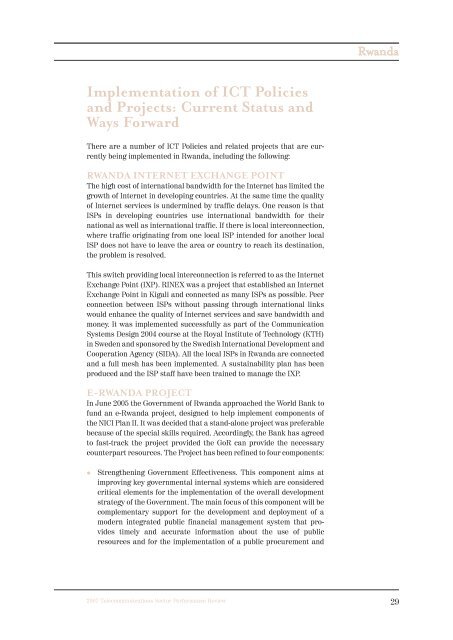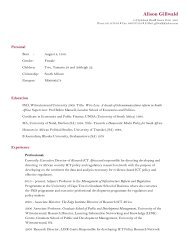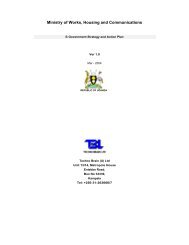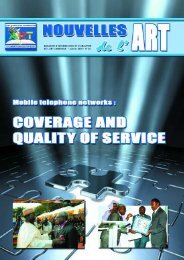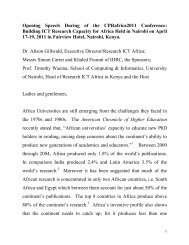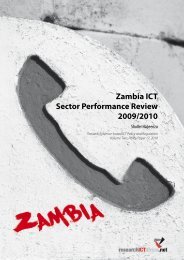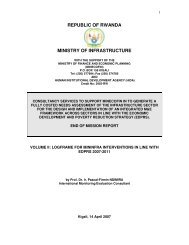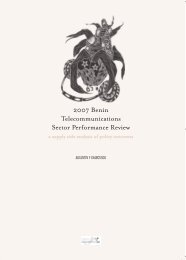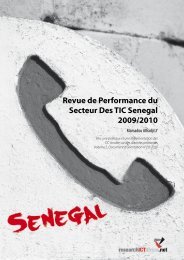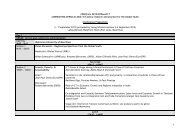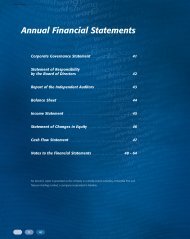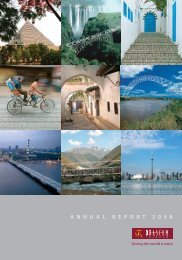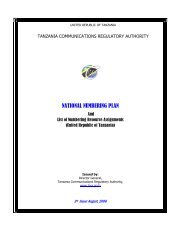Rwanda Telecommunications Sector Performance Review 2007
Rwanda Telecommunications Sector Performance Review 2007
Rwanda Telecommunications Sector Performance Review 2007
Create successful ePaper yourself
Turn your PDF publications into a flip-book with our unique Google optimized e-Paper software.
<strong>Rwanda</strong><br />
Implementation of ICT Policies<br />
and Projects: Current Status and<br />
Ways Forward<br />
There are a number of ICT Policies and related projects that are currently<br />
being implemented in <strong>Rwanda</strong>, including the following:<br />
RWANDA INTERNET EXCHANGE POINT<br />
The high cost of international bandwidth for the Internet has limited the<br />
growth of Internet in developing countries. At the same time the quality<br />
of Internet services is undermined by traffic delays. One reason is that<br />
ISPs in developing countries use international bandwidth for their<br />
national as well as international traffic. If there is local interconnection,<br />
where traffic originating from one local ISP intended for another local<br />
ISP does not have to leave the area or country to reach its destination,<br />
the problem is resolved.<br />
This switch providing local interconnection is referred to as the Internet<br />
Exchange Point (IXP). RINEX was a project that established an Internet<br />
Exchange Point in Kigali and connected as many ISPs as possible. Peer<br />
connection between ISPs without passing through international links<br />
would enhance the quality of Internet services and save bandwidth and<br />
money. It was implemented successfully as part of the Communication<br />
Systems Design 2004 course at the Royal Institute of Technology (KTH)<br />
in Sweden and sponsored by the Swedish International Development and<br />
Cooperation Agency (SIDA). All the local ISPs in <strong>Rwanda</strong> are connected<br />
and a full mesh has been implemented. A sustainability plan has been<br />
produced and the ISP staff have been trained to manage the IXP.<br />
E-RWANDA PROJECT<br />
In June 2005 the Government of <strong>Rwanda</strong> approached the World Bank to<br />
fund an e-<strong>Rwanda</strong> project, designed to help implement components of<br />
the NICI Plan II. It was decided that a stand-alone project was preferable<br />
because of the special skills required. Accordingly, the Bank has agreed<br />
to fast-track the project provided the GoR can provide the necessary<br />
counterpart resources. The Project has been refined to four components:<br />
<br />
Strengthening Government Effectiveness. This component aims at<br />
improving key governmental internal systems which are considered<br />
critical elements for the implementation of the overall development<br />
strategy of the Government. The main focus of this component will be<br />
complementary support for the development and deployment of a<br />
modern integrated public financial management system that provides<br />
timely and accurate information about the use of public<br />
resources and for the implementation of a public procurement and<br />
<strong>2007</strong> <strong>Telecommunications</strong> <strong>Sector</strong> <strong>Performance</strong> <strong>Review</strong><br />
29


